People-to-People Exchanges and Empowerment in ASEAN <3>
The World of 2050, Envisioned by Japanese and ASEAN Youths
2023 Exchange Program Student Participants Speak About Their Experience
An Interview with "Vertedu Ecowarrior," An Environment and Disaster Prevention Education Group
2024.5.2
【Special Feature 081】
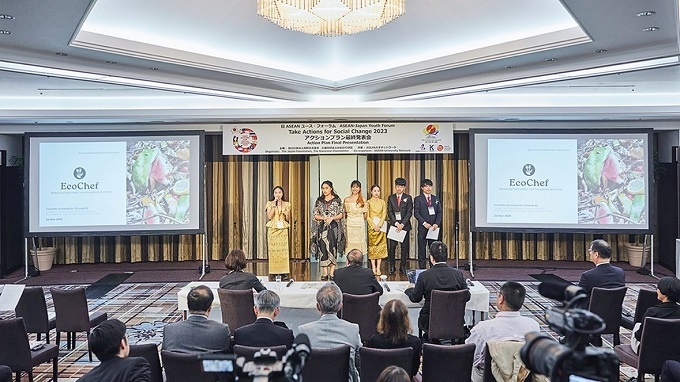
Special Feature: People-to-People Exchanges and Empowerment in ASEAN (for summary on special features, click here )
The ASEAN-Japan Youth Forum: Take Actions for Social Change (TASC) 2023, an exchange program to create deeper mutual understanding between students from ASEAN countries and Japan, took place from July to November 2023. TASC 2023 was a commemorative project of the Japan Foundation and the Kamenori Foundation, organized in partnership with the ASEAN University Network, to celebrate the 50th anniversary of ASEAN-Japan friendship and cooperation. The 30 students, selected from Japanese and ASEAN universities, were divided into six groups covering three topics. While learning together through online training, a field trip to ASEAN countries, and a training visit to Japan, each group collaborated to form an action plan to solve a problem, then unveiled it at the final presentation. In this interview, we spoke with six members of one of the six groups, Vertedu Ecowarrior, an environment and disaster prevention education group, about the results of their exchange program, which has been building friendships among students from different cultures for about six months.
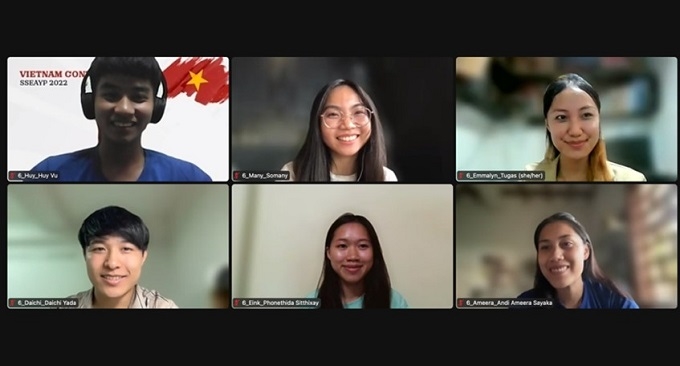
[Interview participants] *In order from top-left
- Huy: Vu Truong Huy (Vietnam, Vietnam National University, Ho Chi Minh City)
- Many: Soun Ratana Somany (Cambodia, Royal University of Phnom Penh)
- Emma: Emmalyn Tactaquin Tugas (Philippines, University of the Philippines Diliman)
- Daichi: Daichi Yada (Japan, Kyoto University)
- Eink: Phonethida Sitthixay (Laos, National University of Laos)
- Ameera: Andi Ameera Sayaka Cakravastia (Indonesia, Institut Teknologi Bandung)
- ▶︎Team name: Vertedu Ecowarrior
- ▶︎Title of Presentation: [EcoChef - Reducing foodwaste, one household at a time]
"We overcame our cultural differences
and were able to form deeper connections"
──How did you form deeper connections with other participants with different cultural backgrounds up until today through the online seminars, a field trip in Indonesia and a visit to Japan for training? Please answer one at a time.
Huy: The first time we met was at an online orientation, but we were too nervous to speak naturally with each other. After that, we had several online sessions. As we actually met face-to-face in Indonesia and Japan, we came to be able to have discussions on various things, and sometimes joke around with one another. I feel that we were able to overcome our cultural differences and form deeper connections.
Daichi: I feel the same way as Huy. I was really nervous, especially when we first met face-to-face in Indonesia. I was worried about whether I would be able to interact well in English with everyone, but it wasn't an issue. I feel that we forged a very strong bond through the field trip and our training visit to Japan. All the participants were all incredibly cool people, and we were able to form unforgettable memories and relationships.
Many: The online seminars were set up so that we could get to know each other, and we had opportunities to learn about the background of each participant and the highlights of their lives. We got along with people from different backgrounds since we were all in the same situation of stepping out of our familiar comfort zone, and were able to share the same experiences. I especially enjoyed working together with everyone to prepare for the presentation. We had discussions while making progress on the project together, with each of the participants from six different countries having their own perspective.
Eink: I was very shy when I first met everyone, but as we worked together as a team, I began to feel that we were forming deeper connections. I think I developed a deeper understanding of cultural diversity, especially during my field trip to Indonesia. I can now express myself with an open mind, as well.
Emma: I saw firsthand how we communicated more with each other as the program went on, and as I talked to each participant, I began to understand diversity and their cultural backgrounds. I also came to appreciate the opportunity to participate in this program, which allowed me to collaborate with amazing people representing Japan and ASEAN countries. Naturally, we discussed academic topics, and we also had conversations about things unrelated to the program, shared wisdom with each other, and discussed action plan solutions. It was truly a wonderful bonding experience.
Ameera: My view is the same as everyone else's. We were complete strangers, and we gradually found common ground. During our field trip to Indonesia, we thought earnestly about the circumstances we were in, and learned that there are still a lot of things we don't know. Each of us shared our own knowledge and incorporated it in the project, and during the training visit to Japan, we worked even more seriously to figure out how to firm up the project to a greater extent.
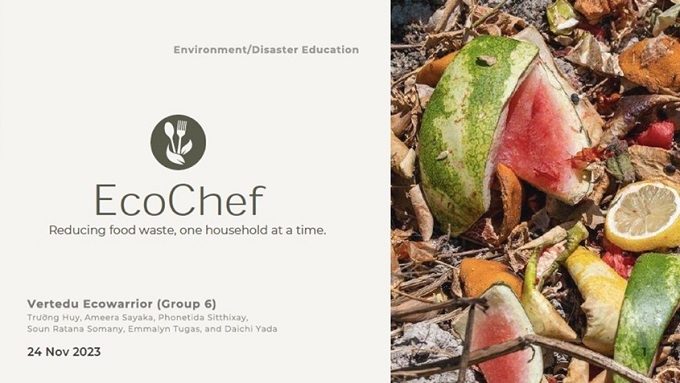
"We leveraged our individual strengths and different
perspectives to create an integrated team"
──What is the meaning behind your team name, "Vertedu Ecowarrior"?
Huy: "Vertedu" is a word we coined, which combines English and French. We wanted to emphasize the importance of educating and enlightening children about the ecosystem by linking "vert"--which means green in French--with "edu," which is short for education in English.
Emma: "Ecowarrior" represents us and the next generation, the people who will make a difference and protect the environment.
Eink: The name "Vertedu Ecowarrior" is about our desire to protect the ecosystem and save a sustainable world.
──Did you decide on the division of roles when you worked together to develop your action plan? Please tell us what efforts you made to make best use of your respective specialties.
Huy: Although I took on the role of group leader during our trips to Indonesia and Japan, I believe that each of us played a leadership role throughout the entire program. Each of us has individual strengths and different perspectives. As we were doing tasks, I think that each of us was able to be the leader in that specific area as we educated each other, including learning about cultural differences, to create an integrated team.
Daichi: We also discussed whether to give the leadership role to someone specific, or if we should take turns. For example, Huy served as leader until the training visit to Japan, then Emma took over. As a result, I think we were able to divide responsibilities and rotate roles very well.
Huy: It was a great opportunity for each of us to demonstrate our abilities. We all have different views and perspectives, and this was an opportunity to get to know each other better.
Many: The most difficult time was when we discussed the action plan in Indonesia. Everyone had their own opinions, and while there were many ideas, we asked: "What's the best topic for us right now?" "What's interesting about it?" "Is there a shared topic that everyone is interested in?" We talked about those questions at length. We had several meetings, and as we conducted research, we developed a mutual understanding of each other's ideas, which we then put together into a single action plan.
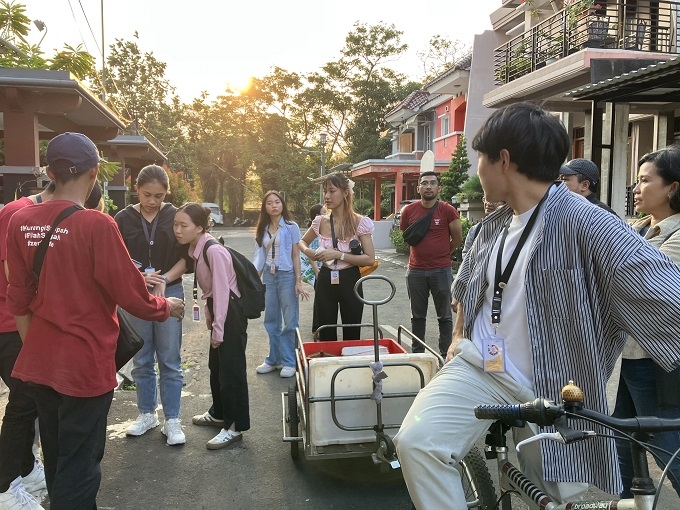
"The idea for EcoChef was born out of discussions
based on our experiences in Indonesia"
──Your team, Vertedu Ecowarrior, devised an action plan called "EcoChef" that addresses the issue of food waste. Please tell us about the details.
Ameera: EcoChef is an application that can be used in daily life, and its aim is to reduce food waste by offering menu suggestions based on what food is in the refrigerator.
Daichi: We decided to do our action plan on the topic of food waste on the last day of our field trip to Indonesia. Food waste was a serious environmental issue in ASEAN. We thought, "What can we do now, what topics do we need to address, and what topics will have the greatest impact?" That's why we chose to focus on food waste.
──Was there something that happened during your field trip to Indonesia that brought you into direct contact with the problem of food waste?
Emma: Speaking for myself, a particularly impactful program in Indonesia was our visit to an organization called Kota Tanpa Sampah, which is working on zero waste-based solutions.
Daichi: Kota Tanpa Sampah is a non-profit organization that goes door-to-door in local communities to collect and compost food scraps. We observed the organization and received a lecture, then actually went around with them and collected food scraps to see how composting is done.
Emma: We asked ourselves, "Where is the solution to eliminate food waste?" We realized that most food waste comes from households, and we thought that we should work on eliminating small-scale waste--household food scraps--before food waste becomes a big problem. After the field trip, we shared our research findings in online meetings, and had repeated discussions about what all of us can do at individual households. I think the idea for "EcoChef" came together based on the impactful experience we had in Indonesia as we discussed specifics about food waste management; in other words, how we should handle food scraps.
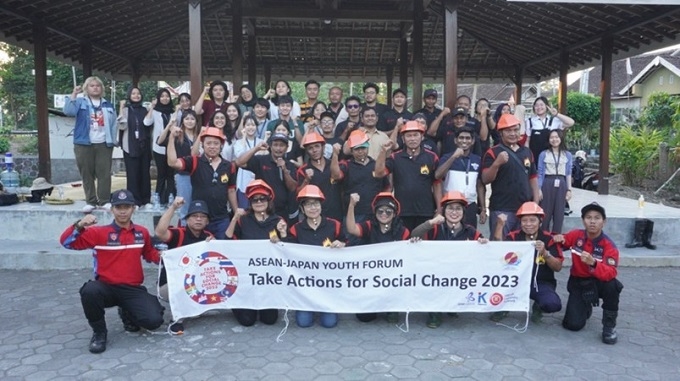
"It was a meaningful learning experience that I couldn't have had
through school lectures alone"
──What was your biggest takeaway from the entire program?
Huy: It really had a great impact on my day-to-day life. Visiting Indonesia and Japan taught me about perspectives that differ from what I've previously known. For example, I learned about critical natural disaster issues, as well as composting and other methods of disposing of food scraps. The program also made me think about how we can contribute to the future. Learning that this experience itself is directly related to my daily life was a great discovery for me.
Daichi: I was surprised that I was able to make a good friend from each of the five ASEAN countries, and at the same time, I feel very proud. There aren't many people in Japan who have these sorts of deep connections with students from other Asian countries. They've inspired me, and I think I've grown a lot. What I learned in the program was very valuable, and a meaningful experience that I couldn't have had through school lectures alone.
Many: I think it was a great achievement that the members from various countries were able to consolidate their ideas into a single plan and take action. Then, each member conducted research and educated the others about what is happening in their country regarding the food waste issue. What can be done? What improvements can be made? It was good that we were able to think about these questions together.
Eink: Of course, we were able to cooperate with each other to create a single project called "EcoChef," but all in all, the biggest accomplishment was being able to achieve major personal growth. Through this program, I was able to gain an in-depth understanding of social issues. In particular, I learned what methods have been successfully used to tackle issues related to the environment and disasters. I'm currently volunteering with an environmental organization in Laos, and I feel that I can apply the knowledge and experience I gained this time to actual activities in Laos, such as dealing with food waste and environmental issues.
Emma: I feel the same way. Though some results have been concrete and others have been intangible, I gained various knowledge through the program that I couldn't have learned in school. It's thanks to everyone on the team. I believe that by expanding local action to promote positive change in each of the ASEAN countries and Japan, we can have a significant impact on sustainable and global environmental issues. And like Daichi says, the most wonderful thing is that we have formed connections with our Japanese and ASEAN peers! I believe that going forward, we will be able to continue collaborating with our friends who have expertise.
Ameera: It was wonderful to receive positive feedback on this project. I think the best achievement was that team members from different cultures, who had different backgrounds and ideas, were able to establish understanding with one other and create a single plan as a comprehensive solution. I'm sure that this is something I can apply in the future in my own country, Indonesia.
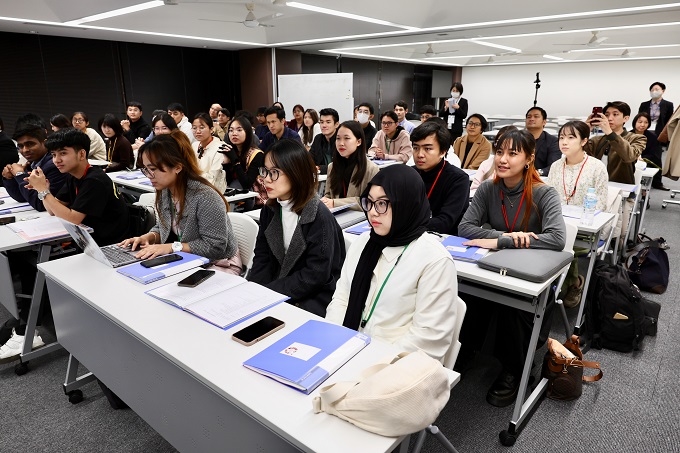
"We were very lucky that we were able to
create a mutually supportive environment"
── What were some of the challenges you faced throughout the program, and how did you overcome them?
Huy: Naturally, we faced a lot of adversity. For example, during our training visit to Japan, knowledge information in the Japanese language, such as signs at airports and subways, was a major barrier, and I didn't know how to move around. When you are not used to something, everything is difficult. I was grateful for the help from Daichi. I did a lot of research, gradually got used to it, and was able to pull through.
Daichi: Speaking for myself, before the project, I wasn't confident that I would be able to converse in English with the ASEAN participants. I think my English skills have improved now, but I was nervous in the beginning. I felt a sense of camaraderie with the others as my ideas were reflected in action plans through meetings with my teammates during in-person and online training sessions, and as we joked around in chat rooms. I gradually gained confidence through these daily conversations.
Many: The time difference was also an obstacle for online meetings, wasn't it? It was difficult to coordinate everyone's schedule; for example, setting up meetings for everyone to talk at the same time, and postponing them if someone couldn't attend.
Ameera: As Many said, it was difficult to balance everyone's schedules. There were times when we had to give up Saturday nights. Then after a meeting, there were assignments we had to complete before the following meeting, as well as homework to share what we learned at the meeting with everyone. It was hard work, but I believe that sharing our learning has really been mutually beneficial.
Eink: I was very anxious because I was worried that I wasn't as capable as the others. Through the program, I believe I was able to overcome that sort of negative attitude. I decided to stop comparing myself to others and to learn from these talented people instead, and to have the courage to move forward. I thought that would be for my own good. Another thing is that we were very lucky to be able to create an environment in which everyone on the team could communicate what they wanted to do; where everyone had a voice and could support each other. Everyone on the team gave me the courage to be confident, which also supported me. Also, during our visit to Japan, the cold weather didn't suit me, but I was able to perk up and participate in all the programs thanks to the support of my mentors and the Japan Foundation staff.
Emma: I think I'm a good communicator, but I'm not good at English conversation, so it must have been difficult for everyone to understand my English. That was the most difficult thing. Part of me is also a perfectionist, so I immediately try to come up with my own answers and have a hard time asking others for help. That's why it was big for me to be able to learn in this program to cooperate with others and to work together with the same zeal for a better world. This story is very memorable; we encountered a situation where the proposal we all came up with in an online meeting after our field trip to Indonesia was not in line with the team objectives. We talked with each other, rebuilt our proposal from scratch, and we created our action plan called "EcoChef" as part of the process through a series of online meetings. It was truly a wonderful experience, and I don't think it could have been done without this team.
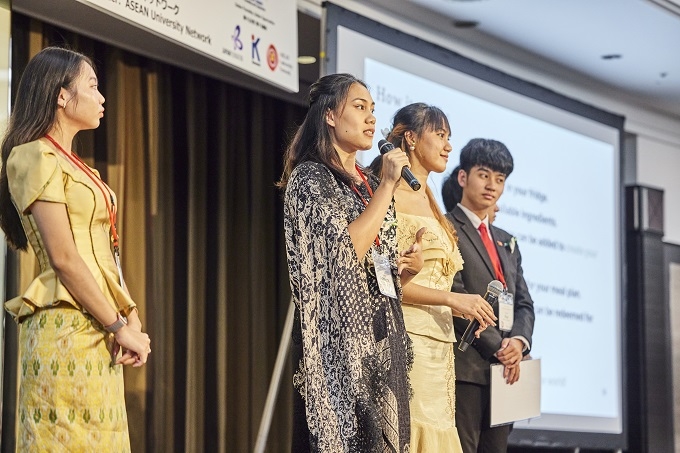
"This experience, which really opened my eyes,
will be useful in my life in the future"
──Please talk about how you would like to take the experiences you gained and apply them to your life in the future, and about your vision going forward.
Huy: I'd like to take what I learned from this program and make use of them in field studies and my future plans. I want to become a government policymaker for a country which has a different cultural background. Recently, I attended a festival in Vietnam and was able to exchange views with people from Japanese companies who had set up booths, sharing stories about my experiences in Japan. I feel that what I have gained from this program, in addition to being useful in the future, has very beneficial for me in the present, too.
Daichi: I major in electrical engineering. Although it's not directly connected to this program, I was able to have various discussions about it. I would like to do research in the future, and I think I'll be able to make full use of this experience when doing international research. I also plan to visit a research lab in the U.S. for six months, starting this fall. I'm sure that the knowledge I gained this time will be strongly linked to my future.
Many: I was able to learn about various cultures in this program. I was also able to meet teammates from different cultures and visit Indonesia and Japan, where the environment is totally different from that of Cambodia. This experience has greatly broadened my horizons, and I know that I will be able to use this experience in Cambodia and in my future life.
Eink: As I said before, I'm volunteering at an environmental organization in Laos, and have been participating in projects to educate the public about the environment and the land. We are planning to do an environmental workshop for children this February, and I'd like to make it a fun workshop using the gamification methods I learned during our field trip to Indonesia. I want to share the environmental knowledge I learned in this program with the workshop participants. As for my future plans, I'd like to build a career in a position related to the environment.
Emma: I graduated from university while participating in the program, and now work for the Department of Health in the Philippines. I would like to apply what I learned in this program to my career going forward. In the future, I would like to address the forgotten issue of food systems such as food waste in ASEAN countries, and to incorporate inclusive perspectives into any innovations. I hope that the solutions we provide will solve a variety of problems, while remaining sustainable.
Ameera: For me, the most memorable part was having the opportunity to speak with experts in various fields. The first thing the experts said was to start with something close to your heart, and grow from there. Those words greatly inspired me. We all have our own visions of what we want to do, whether it is the environment or health, and we all have the potential to bring about major changes that will transform society. However, the first step is to start right away with something small that is close to your heart, and that's what I want to do.
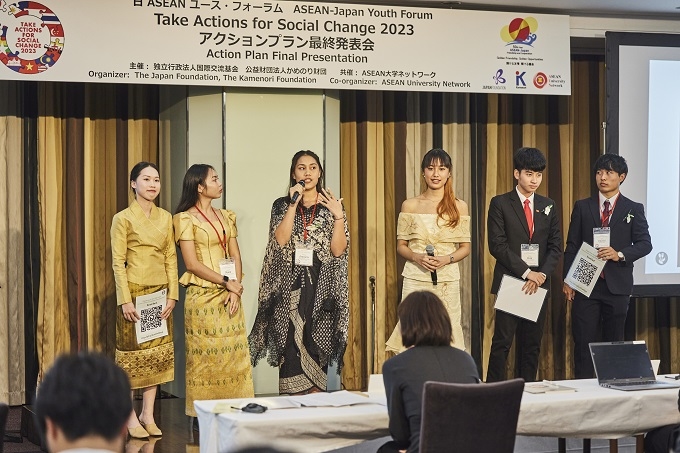
"Let's Create ASEAN- Japan Community Which
Will Have a Wonderful Impact on Our Future"
──We'd like to ask each of you for messages to students from ASEAN countries and Japan who wish to participate in this sort of project in the future.
Huy: Everyone, there is an opportunity right in front of you. Just take it. No one knows what you are capable of, or what the future holds for you. Don't get caught up in the idea that other people are better than you or anything like that, and transform yourself into someone different from before.
Daichi: If you take a step out of your comfort zone, fascinating things are definitely waiting for you!
Many: If you have any ideas, I invite you to take action with your friends in ASEAN countries and Japan.
Eink: If you want to take action and discover some kind of solution, you should join this program!
Emma: It might be a bit scary to try something new, but let's gather knowledge through projects, feel each other's passion, and cooperate with one another to create a ASEAN-Japan community which will have a wonderful impact on our future.
Ameera: First, open your eyes. We are surrounded by a myriad of issues. Let's gather the wisdom of the powerful younger generation and work together.
──Thank you very much for sharing your valuable experiences today.
Interviewed online in January 2024.
Interviews and text: Segami Masako
Keywords
Back Issues
- 2025.6.24 Exclusive Interview:…
- 2025.5. 1 Ukrainian-Japanese I…
- 2024.11. 1 Placed together, we …
- 2024.5.24 The 50th Japan Found…
- 2024.5.24 The 50th Japan Found…
- 2024.5. 2 People-to-People Exc…
- 2024.2.19 Movie Theaters aroun…
- 2024.2.19 Movie Theaters aroun…
- 2023.4.24 The 49th Japan Found…
- 2022.10.24 Inner Diversity <2> …

